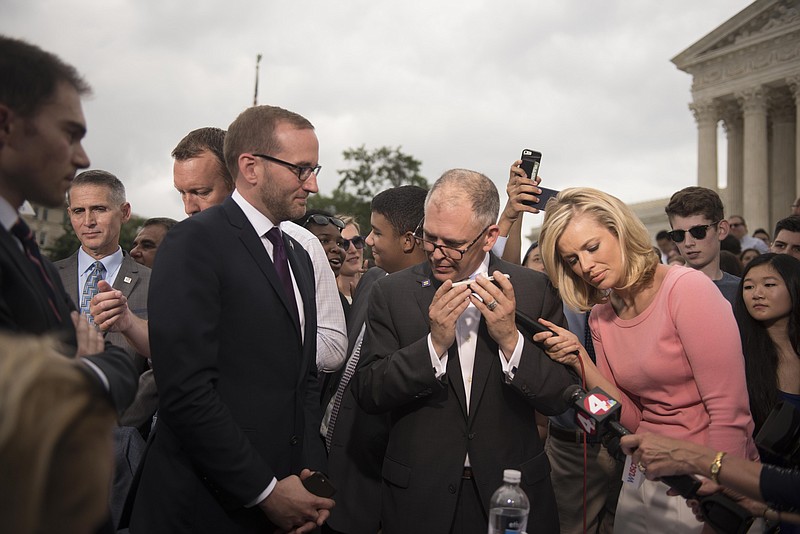NASHVILLE, Tenn. - A legislative push to preserve the "natural and ordinary meaning" of words in Tennessee law prompted a visit to the state Capitol on Wednesday by Jim Obergefell, whose landmark U.S. Supreme Court case legalized same-sex marriage nationwide.
Gay rights groups call the bill awaiting Republican Gov. Bill Haslam's signature a sneaky way of encouraging state judges to deny rights to same-sex couples when laws use words such as "husband" and "wife," or "father" and "mother."
Flanked by GLAAD, Tennessee Equality Project and other LGBT groups, Obergefell declared at a news conference that the bill seeks to circumvent the Supreme Court and roll back rights and protections the LGBT community gained with the ruling.
"Common decency, our shared American ideals of life, liberty and the pursuit of happiness, not to mention the Constitution of the United States, demand that the governor veto this bill," Obergefell said.
Haslam said Monday that he's "not sure there's any new ground" with the bill because the U.S. Supreme Court and state Supreme Court have long used the term "ordinary and natural meaning." He said his office has been deferring to the will of the legislature on the bill all along.
The legislation passed by both houses has been pushed by the Family Action Council of Tennessee, which advocates for one-man, one-woman marriage.
A different bill that gained no traction explicitly cited "husband," ''wife," ''mother," and "father" as having natural and ordinary meanings based on the biological distinctions between men and women. The measure that ultimately passed avoids those specifics, and merely states that any word undefined in state law must be used according to its "natural and ordinary meaning."
The measure also addresses questions raised in a same-sex child custody case in Knoxville, in which the Family Action Council tried to intervene on behalf of 53 state lawmakers, only to be rejected by the circuit court judge.
Despite this background, Sen. John Stevens, R-Huntingdon, insisted that his bill isn't aimed at LBGT people. He said he simply wants undefined words to mean what they meant at the time lawmakers put them into the law.
Asked if the bill could infringe on same-sex couples' ability to have kids or be married, Stevens said he has "no idea."
The legislation passed despite concerns raised by Tennessee Attorney General Herbert Slatery that it potentially conflicts with Obergefell v. Hodges in some instances, as well as a state law that requires gender-specific words to be interpreted as inclusive.
Slatery's opinion predicted that judges would side with the gender-inclusive interpretation when requirements clash. He took the same position when he weighed in on the same-sex custody case, urging that judge to interpret "husband" and "wife" gender-neutrally, as "spouse."
Haslam said Monday that he understands the attorney general's opinion to mean that "he does not see a conflict in that language" in the bill.
Also on Tuesday, the influential Music Business Association called for Haslam's veto, tweeting that the group "values inclusion & celebrates diversity."
